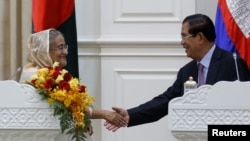Amid a worsening humanitarian crisis that has seen hundreds of thousands of Rohingya refugees flee violence in Myanmar’s Rakhine State, Bangladeshi Prime Minister Sheikh Hasina has sought support for a “durable solution” from Cambodian Prime Minister Hun Sen.
The plea came as Hasina visited Cambodia on Monday to meet with her Cambodian counterpart.
“We have also discussed the Rohingya crisis that threatens peace and stability of our region,” Ms. Sheikh Hasina said. “As we continue our bilateral negotiation with Myanmar for [the] Rohingya’s safe return back to their homeland, I request Prime Minister Hun Sen for his support of a durable solution of the crisis,” she said after the meeting.
Hasina said her country is now hosting about 1 million Rohingya refugees, which won Bangladesh praise from Hun Sen. However, Hun Sen, who last week met Myanmar State Councilor Aung San Suu Kyi in Beijing, did not use the word Rohingya during the press conference.
“We highly appreciate Bangladesh which, despite its population of approximately 160 million, the country still shoulders another approximately one million refugees from Myanmar,” Hun Sen said.
“We will consider together about the repatriation of the refugees in the hope that the two countries – Bangladesh and Myanmar – will work together smoothly for the safe return of the refugees back to Myanmar,” he added.
Cambodia has historically considered upheaval in its fellow Asean members states as internal affairs not warranting intervention. Last month, Cambodia was one of ten states to vote against a resolution on te Rohingya, along with Laos, Vietnam, China, Russia, Philippines, Zimbabwe, Syria, Belarus, and Myanmar itself.
Phay Siphan, government spokesman, said Cambodia’s position remains to not “internationalize” the crisis, which it sees as a bilateral issue between Myanmar and Bangladesh.
“We do not use any term that may effect any decision or make an identification of the crisis. We firmly believe that is the internal affair of the Burmese people,” he said, referring to the use of the term Rohingya.
Phil Robertson, deputy director of Human Rights Watch’s Asia division, said there was no chance given the current circumstances for a safe return to Myanmar of the Rohingya.
“To date, there have been basically no protection guarantees made to returning Rohingya, who obviously don’t trust the Myanmar military and will not go back anywhere close to them because of the atrocities that they and their family members recently suffered,” Roberson said.
Chheang Vannarith, a Singapore-based analyst with the ISEAS Ishak Yusof Institute, said Cambodia had potentially put its relationship with Myanmar at risk by speaking out about the crisis.
“By engaging with the Rohingya topic, one country put their relations with Myanmar at risk,” he said.
Bangladesh Seeks Cambodian Support for ‘Durable Solution’ to Rohingya Crisis
- Aun Chhengpor
- VOA Khmer

Government spokesman said Cambodia’s position remains to not “internationalize” the crisis, which it sees as a bilateral issue between Myanmar and Bangladesh.
PHNOM PENH —



